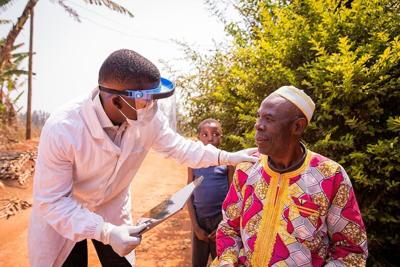Key Takeaways
At least nine people in Ethiopia have Marburg virus
The disease has an average fatality rate of 50%
WHO is helping contain the outbreak and prevent spread
MONDAY, Nov. 17, 2025 (HealthDay News) — At least nine people in southern Ethiopia have been infected with Marburg virus, a deadly illness similar to Ebola.
This marks the country’s first known outbreak of the highly contagious disease, the World Health Organization (WHO) said.
Ethiopia’s Ministry of Health has also confirmed the cases.
WHO director general Dr. Tedros Adhanom Ghebreyesus said the agency "is actively supporting Ethiopia to contain the outbreak and treat infected people, and supporting all efforts to address the potential of cross-border spread," according to The Washington Post.
Marburg virus disease is a severe hemorrhagic fever that spreads through direct contact with an infected person’s blood, saliva, urine or other body fluids. It can also spread from touching contaminated surfaces.
The virus comes from the same family as Ebola and was first identified in 1967 after outbreaks in Germany and Serbia.
Early symptoms include fever, headache, chills and muscle pain, according to the U.S. Centers for Disease Control and Prevention (CDC).
Some people may also have nausea, vomiting, chest pain or diarrhea. A non-itchy rash can appear within a week of symptoms starting.
In severe cases, the virus can lead to heavy bleeding, organ failure and shock. The WHO says deaths often occur 8 to 9 days after symptoms begin and the average fatality rate is about 50%.
There are no approved vaccines or antiviral medicines for Marburg virus.
Previous outbreaks have occurred in Angola, the Democratic Republic of Congo, Ghana, Kenya, Equatorial Guinea, Rwanda, South Africa, Tanzania and Uganda.
Lab testing shows Ethiopia’s cases involve the same strain seen in earlier East African outbreaks.
Experts believe the virus likely first spread from bats to humans and it can reappear in areas where it has been before.
More information
The World Health Organization (WHO) has more on the Marburg virus disease.
SOURCE: The Washington Post, Nov. 14, 2025
What This Means For You
Experts say that the Marburg virus is rare but often deadly and spreads through contact with infected blood or body fluids.





















(0) comments
Welcome to the discussion.
Log In
Keep it Clean. Please avoid obscene, vulgar, lewd, racist or sexually-oriented language.
PLEASE TURN OFF YOUR CAPS LOCK.
Don't Threaten. Threats of harming another person will not be tolerated.
Be Truthful. Don't knowingly lie about anyone or anything.
Be Nice. No racism, sexism or any sort of -ism that is degrading to another person.
Be Proactive. Use the 'Report' link on each comment to let us know of abusive posts.
Share with Us. We'd love to hear eyewitness accounts, the history behind an article.